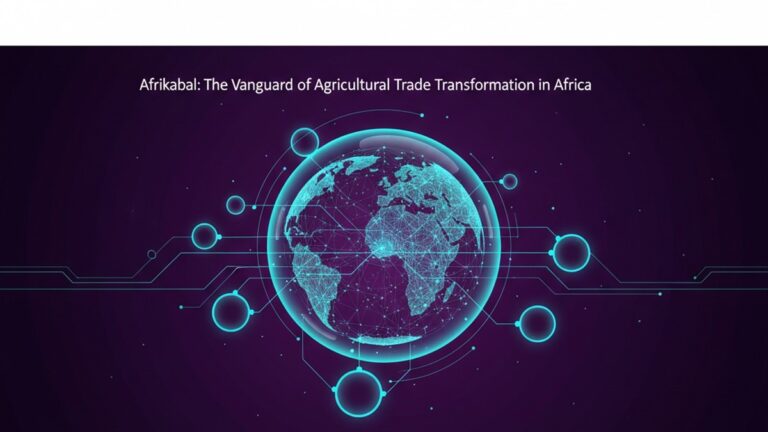In the rapidly evolving world of cryptocurrency and blockchain, a Rwanda-based startup, Afrikabal, is making waves by reimagining the landscape of agricultural trade in Africa. Built on the Lisk blockchain, Afrikabal isn’t just another marketplace; it aims to become the SWIFT of agriculture. By establishing a blockchain-based infrastructure that governments, institutions, and farmers can trust, the startup is setting a new standard for agricultural transactions across the continent.
The Vision Behind Afrikabal
Afrikabal’s mission is ambitious yet straightforward: to streamline and secure agricultural trade in Africa using the power of blockchain technology. While many might assume it’s just another digital marketplace, Afrikabal is setting itself apart by focusing on infrastructure rather than just transactions. This unique approach positions Afrikabal as a potential game-changer in the agricultural sector, aiming to bring the same level of efficiency and reliability to agriculture that SWIFT brings to banking.
At the heart of Afrikabal’s operations is the Lisk blockchain, known for its flexibility and scalability. By leveraging Lisk, Afrikabal can create a decentralized platform that offers transparency, reduces fraud, and minimizes the costs associated with traditional agricultural trade. Farmers, governments, and institutions can all benefit from a system where transactions are not only faster but also more secure.
A Trustworthy Ecosystem
In a continent where agriculture is a cornerstone of many economies, trust is paramount. Afrikabal understands this, and its platform is designed to build trust at every level. By using blockchain technology, Afrikabal ensures that every transaction is verifiable and immutable, providing a clear record that can be trusted by all parties involved. This level of transparency is crucial in a sector where disputes over transactions can often arise.
For farmers, Afrikabal offers a reliable way to reach new markets without the fear of fraud. Meanwhile, governments and institutions benefit from a system that can seamlessly integrate with existing agricultural policies and regulations. This inclusive approach ensures that Afrikabal’s platform is not only effective but also adaptable to the diverse needs of the African agricultural landscape.
Challenges and Opportunities
However, Afrikabal’s journey is not without its challenges. The agricultural sector in Africa is vast and varied, with different regions facing unique logistical and infrastructural challenges. Implementing a blockchain-based solution across such a diverse landscape is no small feat. Moreover, achieving widespread adoption requires overcoming skepticism and ensuring that all stakeholders understand the benefits of transitioning to a digital platform.
Despite these challenges, the opportunities for Afrikabal are immense. Africa’s agricultural sector is ripe for innovation, and Afrikabal’s platform could revolutionize how trade is conducted. By reducing transaction costs and increasing efficiency, Afrikabal has the potential to improve the livelihoods of millions of farmers and boost economic growth across the continent.
The Role of Lisk
Lisk’s blockchain technology plays a pivotal role in Afrikabal’s strategy. Known for its developer-friendly environment, Lisk allows Afrikabal to build customized applications that meet the specific needs of the agricultural sector. This flexibility is crucial, as it enables Afrikabal to adapt its platform to the varying requirements of different regions and stakeholders.
By utilizing Lisk, Afrikabal can also ensure that its platform remains scalable as it grows. This scalability is essential for accommodating the increasing volume of transactions that will occur as more farmers and institutions join the platform. Furthermore, Lisk’s commitment to security ensures that Afrikabal’s platform remains secure against potential threats, providing stakeholders with peace of mind.
A Balanced Perspective
While Afrikabal is undoubtedly a promising venture, it’s important to consider the broader context in which it operates. The success of Afrikabal will largely depend on its ability to collaborate with governments and institutions to create policies that support the integration of blockchain technology into agriculture. Additionally, Afrikabal will need to invest in education and training to ensure that farmers and other stakeholders can effectively utilize the platform.
On the other hand, Afrikabal’s focus on creating a trustworthy and efficient infrastructure could set a precedent for other sectors in Africa. By demonstrating the benefits of blockchain technology in agriculture, Afrikabal could pave the way for similar innovations in other industries, further propelling Africa into the digital age.
In conclusion, Afrikabal’s vision of becoming the SWIFT of agriculture is not just a lofty goal; it’s a necessary evolution in the way agricultural trade is conducted in Africa. By leveraging the power of Lisk’s blockchain technology, Afrikabal is building a platform that promises transparency, security, and efficiency. As the startup continues to grow and overcome challenges, it holds the potential to transform the agricultural sector and drive economic growth across the continent.

Steve Gregory is a lawyer in the United States who specializes in licensing for cryptocurrency companies and products. Steve began his career as an attorney in 2015 but made the switch to working in cryptocurrency full time shortly after joining the original team at Gemini Trust Company, an early cryptocurrency exchange based in New York City. Steve then joined CEX.io and was able to launch their regulated US-based cryptocurrency. Steve then went on to become the CEO at currency.com when he ran for four years and was able to lead currency.com to being fully acquired in 2025.


